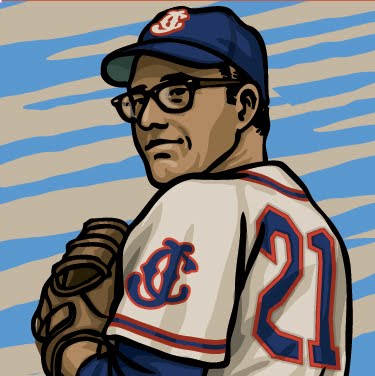I've said it before many times, but I'll say it again: one of the best benefits about writing/illustrating The Infinite Baseball Card Set is all the baseball historians, writers and artists I've met. I've asked a few to be a "Guest Author" on here and this week I'm pleased to have Angelo Louisa. You may have heard of him, he's been the author, co-author or editor of a bunch of solid baseball books, and there's a good chance one of them sits on your bookshelf right now. I know his book on the 1926 Pirates sits on mine, and Angelo chose a character from that very book as the subject of this week's story...
With virtually the same personnel that had won both the National League pennant and the World Series the previous season, the 1926 Pittsburgh Pirates were favored by the majority of preseason prognosticators to capture the pennant for the second year in a row. But they ended up in third place, four and a half games behind the St. Louis Cardinals.
That failure has largely been attributed to the
alleged dissension caused by the presence of vice president and assistant to
the manager Fred Clarke on the Pirate bench and to the ramifications of an
attempt by several players to remove him, known as the "ABC Affair."
For the casual fan of baseball history,
the name Fred Clarke may not mean anything.
But for the knowledgeable fan or the baseball historian, it may conjure
up images of the fiery player-manager of the Louisville Colonels and Pittsburgh
Pirates, someone who was elected to the National Baseball Hall of Fame as a
left fielder but who could have been elected as either a player or a
manager. As a player, Clarke was an
excellent hitter, an aggressive base runner, a daring defender, and a fierce
competitor who, according to Baseball-Reference.com (as of September 18, 2016),
placed in the final seasonal top 10 in positive offensive and defensive statistical
categories 194 times (not including games played, defensive games played as an outfielder,
at bats, and plate appearances) throughout his 21-year career in the National
League. As a manager, he led his teams
to four pennants, one World Series championship out of two appearances, a
remarkable 14 straight first-division finishes, and a .576 regular-season winning
percentage (.595 with the Pirates). And
he accomplished these feats while managing against such notable skippers as Ned
Hanlon, Frank Selee, George Stallings, John McGraw, and Frank Chance.
However, even the knowledgeable fan or
the baseball historian may not be aware that Clarke was much more than a
baseball personage. The ninth of 12
children of a blacksmith-farmer and his homemaker wife, Clarke used his dual
passions of baseball and working the soil, his athletic and mechanical talents,
and his optimistic nature and belief in fate to become an outdoorsy Renaissance
man and a multimillionaire. During his
nearly 88 years in this world, Clarke was an innovative and highly successful
rancher whose income skyrocketed when oil was discovered on his land; a Kansas
state champion amateur trapshooter; an outstanding equestrian who did riding
tricks from the back of his horse; an avid hunter, fisherman, and golfer; and a
skillful inventor who created and held patents for, among other things,
flip-down sunglasses, sliding pads, and a mechanical apparatus for putting the
tarpaulin over the baseball field.
In addition, Clarke was a community
leader in Winfield, Kansas, who co-founded the area’s country club, helped to
build the town’s current Holy Name Catholic Church, and stood up to the Ku Klux
Klan when it tried to harass him for being a Roman Catholic.
Nor would the knowledgeable fan or the
baseball historian necessarily be aware that, at the request of Pirate owner
Barney Dreyfuss, Clarke returned to the Pirates in 1925 as assistant to the
owner, assistant to the manager, and head of scouting and was one of the key
people responsible for the Bucs winning the National League pennant and the
World Series championship that year.
Clarke remained with the Pirates in 1926, having become vice president
of the club during the offseason while retaining his positions as assistant to
the manager and head of scouting, and endeavored to aid them in seizing another
pennant. But his efforts came to naught. A talented Pirate team did not live up to
expectations and a scapegoat had to be found to explain the bronze medal finish. For certain Pittsburgh sportswriters and fans,
that scapegoat was Clarke, a belief that some later writers have also held.
However, in 2006, I began to research
the ’26 Pirates in general and the ABC Affair in particular, looking at all
five mainstream Pittsburgh newspapers—not just those that criticized Clarke or
those that have been digitized—as well as various player interviews and other
primary sources and discovered that the blame assigned to Clarke
has been mostly misplaced and that the reasons for the Bucs' failure were far
more complex. The result of my research
is a book titled The Pirates Unraveled:Pittsburgh’s 1926 Season, which was published last October by
McFarland. But I’ll resist temptation to
say anything else about it because I want you to read the details for yourself. To order a copy of the book, go to
www.mcfarlandpub.com.




No comments:
Post a Comment